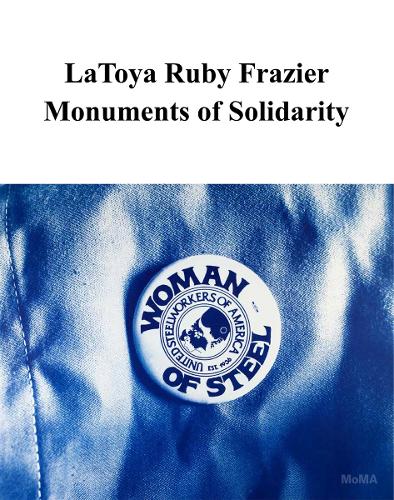
LaToya Ruby Frazier: Monuments of Solidarity
(Paperback)
Publishing Details
LaToya Ruby Frazier: Monuments of Solidarity
By (Author) Roxana Marcoci
Contributions by Emilie Boone
Contributions by Carson Chan
Contributions by LaToya Ruby Frazier
Contributions by Oluremi C. Onabanjo
Contributions by Delphine Sims
Museum of Modern Art
Museum of Modern Art
16th July 2024
12th May 2024
United States
Classifications
General
Non Fiction
709.2
Physical Properties
Paperback
264
Width 240mm, Height 305mm
1500g
Description
Published in conjunction with the first comprehensive museum survey dedicated to the artist, LaToya Ruby Frazier: Monuments of Solidarity presents the full range of her practice and includes rarely seen and brand-new bodies of work.
For more than two decades, the artist-activist LaToya Ruby Frazier has used photography, text, moving images, and performance to revive and preserve forgotten narratives of labor, gender, and race in the postindustrial era. Frazier has cultivated a practice that builds on the legacy of the social documentary tradition of the 1930s, the photo-conceptual forays of the 1960s and 1970s, and the work of socially conscious writers like Upton Sinclair, James Baldwin, and bell hooks. Monuments of Solidarity celebrates the creativity and collaboration that persist in the face of industrialization and deindustrialization, racial and environmental injustice, gender disparities, unequal access to health care and clean water, and the erosion or denial of fundamental human rights. A form of Black feminist world-building, Frazier's nontraditional "monuments" demand recognition of the crucial role that women and people of color have played, and continue to play, in histories of labor and the working class.
Published in conjunction with the first comprehensive museum survey dedicated to the artist, LaToya Ruby Frazier: Monuments of Solidarity presents the full range of her practice and includes both rarely seen and brand-new bodies of work. An illuminating overview essay by the exhibition's curator, Roxana Marcoci, is accompanied by a manifesto by the artist and a suite of focused essays by other curators and scholars.
Reviews
Frazier works with a militant love for the proletariat; her photos extinguish the images of ignorance and bigotry associated, in the Trump-era and today, with talk of the American working class, and counterprograms her audience with pictures from a solidaristic, woman-led, and multiracial movement.--Ciaran Finlayson "4Columns"
Any serious monument-builder working on the tough joint tasks of truth-telling and healing, must tackle and resolve, again and again. Frazier is such a builder and, in our present thug-threatened moment, a needed one.--Holland Cotter "The New York Times: Arts"
Gathering these and other projects, the MoMA survey traces, for the first time in one place, Frazier's journey toward this kind of civic polyphony.--Siddhartha Mitter "The New York Times: Arts"
Groundbreaking in exploring in depth the lives and situations of working people in places of crisis and in giving space to their voices.--Lyle Rexer "Photograph"
Monuments of Solidarity' makes the case for this maximalist approach to photograph, one in which the photographer is never just a documenter, but an active agent in the story being investigated.--Veronica Esposito "Guardian"
Author Bio
Roxana Marcoci is The David Dechman Senior Curator of Photography and Acting Chief of the Department of Photography at The Museum of Modern Art, New York.
Emilie Boone is an assistant professor of African American/African Diaspora Arts in the Department of Art History at New York University.
Carson Chan is the Director of the Emilio Ambasz Institute for the Joint Study of the Built and Natural Environment at MoMA.
Oluremi C. Onabanjo is an Associate Curator in the Department of Photography at MoMA.
Delphine Sims is a PhD candidate in the History of Art Department at UC Berkeley, where she studies the history of photography in the Americas.
LaToya Ruby Frazier was born in 1982 in Braddock, Pennsylvania. Her artistic practice spans a range of media, including photography, video, performance, installation art, and books and centers on the nexus of social justice, cultural change, and commentary on the American experience. Frazier is the recipient of many honors and awards including a 2015 MacArthur Foundation Fellowship.
